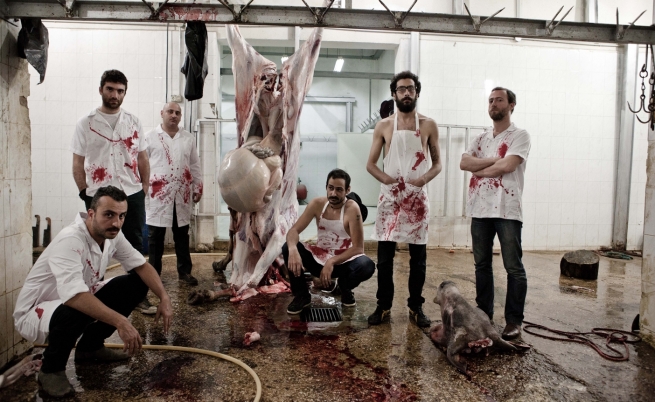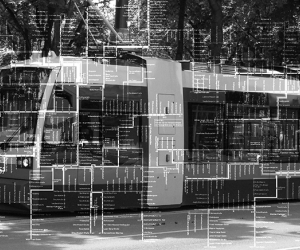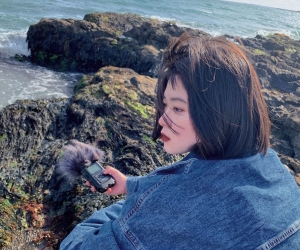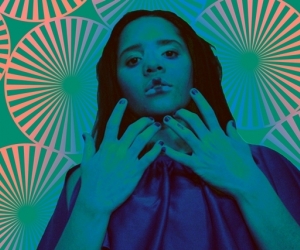The experimental music scene in Beirut, Lebanon, may exist in relative geographic isolation from other global movements of a similar ilk, but over the past fifteen years it has become a dynamic hub for a dense concentration of fiercely independent musical voices. From humble beginnings and tiny numbers, the close-knit community has grown and thrived, even in the midst of the 2006 war. It has spawned numerous notable ensembles, the celebrated Irtijal—International Festival of Experimental Music in Lebanon—and a host of record labels that document the scene’s primary exponents. And throughout it all, the musicians’ inventiveness, artistic integrity, resilience, and staunchly DIY ethos has remained intact.
Today, Beirut experimental-music concerts attract large, attentive audiences. But things didn’t start off that way. When the scene’s two primary players started playing live music, it was, by and large, just them.
Mazen Kerbaj and Sharif Sehnaoui first met in their late teens. Over numerous late-night sessions listening to psychedelic and prog-rock bands, they would stay up till dawn, talking and listening, laying the foundation for an ongoing creative exchange that remains potent some twenty years later. It was then that their respective musical trajectories began to take shape.
Kerbaj enrolled in the visual-art and design program at the Lebanese Academy of Fine Arts (ALBA) but also began taking lessons at the National Conservatory, after Sehnaoui gave him a trumpet that was lying around the house. But Kerbaj withdrew from formal musical training. “It was totally impossible to speak with the teacher about music,” he states matter-of-factly. “So I stopped, and continued on my own—not very seriously at first, just for playing music with friends. I never thought I would become a musician.”
Sehnaoui moved to Paris in 1995. By 1996 he had fixed on the idea of becoming a professional musician and enrolled in jazz school. He also began taking in concerts, and was alarmed to discover that free jazz had penetrated the mainstream. “ ‘What are these guys doing? This is not jazz!’ I’d say, but then I found some interest and logic to it,” explains Sehnaoui, who often smuggled newly acquired musical knowledge back home with him.
The sonic adventure began to escalate for both young players, as they discovered Cecil Taylor, Peter Brötzmann, Evan Parker, and others along the free jazz and improvisational spectrum. As the pair pushed their aesthetic thresholds further, they also expanded their own vocabularies. After a year and a half at jazz school, Sehnaoui broke a finger and had to drop out. Instead of reenrolling once the finger healed, he plunged headlong into the Paris improv community through workshops at Les Instants Chavirés. Seeing Barry Guy play bass with preparations was a revelatory experience for Sehnaoui, who immediately started adapting these ideas to the guitar, culminating in the resonating machine-like percussive style that has since become his hallmark.
Back in Beirut, Kerbaj practised, eagerly awaiting Sehnaoui’s semiannual visits. “The biggest shift, I’d say, is when I began to work by night,” Kerbaj recalls. “I had day work and my wife was pregnant, so I had to work by night at a very, very, very low volume level. So that’s when I stopped playing notes and tones, and went to really small sounds to train hands, my fingers, my lungs, et cetera. I ended up liking these sounds and wanting to play them, rather than play ‘out loud.’”
The two improvisers gradually developed a small network of people who would play experimental improvised music, and in 2000 organized a concert they regard as the precursor to Irtijal. It began with a saxophone duet performance by Kerbaj and Christine Abdelnour (then Sehnaoui’s wife), a Paris-born musician of Lebanese descent and another influential force in the scene’s early days. (Back then Kerbaj was shifting between trumpet and saxophone, learning circular breathing and other techniques on the sax, later bringing them to the trumpet.) Sehnaoui played a solo set of prepared guitar, and the concert concluded with him and Kerbaj in duo.
“We invited twenty to forty people, and some stayed to the end just to insult us,” Kerbaj recalls. “We were very young and provocative and, somehow, hearing people say, ‘You're playing shit’ was almost taken as a compliment.”
“People would basically laugh at almost every show we did between 1998 and 2003—for various reasons,” Sehnaoui notes. “Not only did they not understand the music, but we were barely capable of doing a forty-minute set!”
Nevertheless, Kerbaj and other players started to gain a modest momentum and notoriety. Twenty-year-old Charbel Haber stuck around after that 2000 concert to demand an explanation of why they were playing that kind of improvised music. He now plays in various ensembles with Kerbaj and Sehnaoui. His band Scrambled Eggs transformed from an alternative rock unit into an omnivorous ensemble embracing various strains of experimental rock, as well as the textures of their improv peers.
In 2001 Kerbaj was asked to record a track for Beirut Incognito, a compilation put out by the hip Beirut alternative record shop La CD-Thèque. A dog’s breakfast of various independent productions, Kerbaj’s trumpet-solo track “Songs for Evan (Part 3 & 5)” stuck out like a sore thumb and elicited various reactions, few of them neutral. Shop owner Tony Sfeir played it in the store for a local experimental music aficionado, while Kerbaj hovered anonymously. The customer mistook it for Vinko Globokar, heartening the young player. Other customers were less charitable and returned the disc, assuming Kerbaj’s track was faulty. But the divisive track proved crucial to the growth of the local community of improvisers, which included La CD-Thèque employee and double-bassist Raed Yassin, who was working with jazz bassist Jack Gregg (a sideman on Marion Brown’s famed ECM disc Afternoon Of A Georgia Faun). In Kerbaj’s track, Yassin heard a compatible collaborator.
Their powerful musical chemistry and embryonic jam sessions blossomed into A Trio—Kerbaj, Sehnaoui and Yassin—which remains a pillar of the scene. The players are extraordinarily well-matched, their elusive, sustained, timbrally oriented playing intertwining to generate opaque thickets of sound. Yet there’s also a hallucinatory lightness in the weightless dance of overtones that float above dense sonic foliage. Their now instantly recognizable sound led Swedish writer Thomas Millroth to call it “textural swing,” referring to their deft handling of timbral gradations, but through a more visceral extroverted sense of gesture that swings like Coltrane-lineage free jazz.
“Initially we were influenced by free jazz as this really energetic loud music, but we began practicing to contain this flow of energy through exercises,” Sehnaoui elaborates. “A Trio spent four or five days in Amsterdam at STEIM (Studio for Electro-Instrumental Music) trying to record a minimalist album. We actually have the album, but after a few years of discussion we decided not to release it, because it’s really not our music.
“The Middle East is a very lively area of the planet. In Lebanon, there’s this mixture of cultures and religions, so obviously it’s hard for us to be influenced by minimalism, as such, or to perform it. Silence is not really our environment. Normally our impulse is toward energy and to fill the space with sound.”
The first official Irtijal festival, another 2001 milestone, featured a modest local lineup, but also reached out to some French musicians. With newfound confidence, the growing community of Beirut improvisers found its international profile rise. In May 2005, Kerbaj established the label Al Maslakh, announcing its arrival with the solo trumpet record Brt Vrt Zrt Krt, which garnered a few favourable reviews in the Western experimental music media. That year Irtijal extended its scope to include more foreign artists, including the duo of legendary reedsman Peter Brötzmann and drummer Michael Zerang. A recording of their performance later became one of Al Maslakh’s most successful titles. April 2006 saw the festival double in length to a full week, hosting a variety of American and European improvisers including Jack Wright, Magda Mayas and Axel Dörner.
Then that summer, war broke out.
During Israel’s bombing of Lebanon in July 2006, the housebound Kerbaj experienced a surge of creativity, uploading countless single-pane comics to a blog he had started in order to express his personal response to the conflict. He also recorded himself improvising against the soundscape of falling bombs, collecting nine hours of recordings during nightly sessions. “It was better than just sitting and hearing the bombs,” he explains. “Obliging your brain and body to respond to this, rather than just listening, puts you in another position.” The dangerous meditative ritual yielded “Starry Night,” a short, rather unrepresentative and misunderstood recording, which nevertheless brought international visibility to Beirut experimental musicians.
The solo improvisation—or duet, as he cheekily describes it— achieved unprecedented viral distribution online, painting a vivid, if convenient, portrait of an artist in a landscape besieged by war. “Sometimes I want to find the pilot who dropped the bombs, and say, ‘Thank you. And sorry that I never gave you any royalties’,” he says wryly.
Listeners abroad hastily seized upon a perceived political statement, despite Kerbaj’s personal very antipolitical stance (he calls himself “a friendly anarchist”). While he acknowledges that it’s difficult to divorce the piece from its political resonances, it was far from a rallying cry, he asserts, and he only shared it because of curious friends and peers, who had seen it mentioned on his blog. Kerbaj says the need to excavate political motives also dogged the reception of his work prior to “Starry Night,” particular among Western audiences and media. “When I would play outside of Lebanon, even before the 2006 war, people would say, ‘I hear the sounds of war in your music.’ We people outside the West have to correspond to a certain idea the occident has about us. We’re required to be this pineapple, this exotic fruit.”
Sehnaoui cuts to the core, ascribing this aversion to politics as a response to the deep-seated dysfunctionality in Lebanon’s government. “We try to stay as far away from politics as we can,” he says. “It’s important, because politics in Lebanon are fucked up.
“In a way, all of the music we do, in and of itself, is a political statement,” he continues. “A statement in support of open-mindedness, civil society, the arts, diversity, creating new ideas. This is a worldwide phenomenon [but] it’s especially relevant in Lebanon, where nothing is working, really, and the political and cultural heritage we have is leading the country to chaos. It’s important to have new perspectives and new identities emerge and to offer the arts as an alternative to politics and religion. [That’s] as political as it can get in that sense, but there are no clear political references.
“Once, in the U.S., we were touring and there was a Q&A session at one of our shows. A woman desperately wanted us to take a stance against some political parties in Lebanon—the ones who are officially against American policies. Some of the band members were indeed against those parties, but I said, ‘We are just here for music, it’s not the place for debate.’ She insisted, ‘You as artists have a responsibility to take a stance against those religious extremists! It’s immature if you don't make a statement. We’re giving you a chance to make a statement!’ So I said, ‘You want me to make a statement? I hope everybody will agree and that we’ll make peace and all live happily ever after.’ She threw the microphone down and said, ‘This is shocking. I can't stay here’— and left. It was very, very stressful.”
As the raids ceased, and the ensuing depression settled, so did the commotion around “Starry Night,” relieving members of the scene to consider seemingly more pertinent questions about musical identity. Sehnaoui moved back permanently to Beirut by 2008, after thirteen years spent primarily in Paris. His move signalled full-scale immersion as he resituated himself at the administrative helm for Irtijal and Al Maslakh. “Mazen and I were always concerned about the development of a scene in Lebanon and, beyond that, in the Arab world some day. This idea inhabits us to this day, and it is the main reason why I moved back,” he says proudly. His return home prompted some aesthetic reevaluation. “Coming from a very radical free-improvisation way of thinking and playing, I had to change my way of thinking and playing when I moved back to Lebanon. It became crucial to expand my playing, adapt to different contexts. Over the last five years I’ve developed a liking for this kind of indescribable mixture of genres.”
Raed Yassin’s work has emerged as a focal point for this diversity. In addition to A Trio, his practice also extends into more sample-based and reference-driven work. His duo Praed, with Swiss ex-pat Paed Conca, hot-wires dub, Egyptian Shaabi, experimental rock, improv, and electronica to produce a hybrid rife with odd timbres and melodies of explicitly Middle Eastern orientation. His explorations under his own name produced The New Album (2009), a decidedly collagist affair showcasing his turntablism, which cuts together decimated snippets of vintage Arabic pop. It also involves work with open-circuit electronics and computer. Annihaya (see sidebar), the new label that Yassin, Sehnaoui, and designer Hatem Imam launched with this release, epitomizes the scene’s eclecticism. A glut of more diverse and stylistically ambiguous releases appeared on Al Maslakh around the same time, and the label hit its aesthetic breaking point, spilling over into its boisterous newer spin-off label Johnny Kafta.
Charbel Haber, now a veteran musician in Beirut, is also instrumental in keeping things suspenseful when it comes to questions surrounding genre. His solo and collaborative work—informed by the likes of Faust, Glenn Branca, Sonic Youth, et al.—inject a healthy dose of rock’n’roll into the community, which had traditionally been rooted in European improv.
Lebanese musicians living or born abroad have an impact on the Beirut scene that should not be underestimated. Although Christine Abdelnour eventually disassociated herself from the scene, after making many crucial contributions, others, like Berlin-based Rabih Beiani (known across Europe by his pseudonym Morphosis), are fully integrated into the scene. A practitioner of a particular strain of analog-gear-driven techno, Beiani’s recent release Albidaya (Annihaya) finds him delving into his own brand of freeform electronic psychedelia. Montreal-based Radwan Ghazi Moumneh (see sidebar) and Paris-based Tarek Atoui routinely play and collaborate with musicians in Beirut. Notable non-Lebanese musical residents include Paed Conca and Stéphane Rives.
“If you take away the financial issues we face and general economics of the country, which has a negative impact on the scene on many levels, the scene is wonderful. It grew in proportions we would never have bet on when we started to do things here,” Sehnaoui says.
“After ten years, actually seeing a new generation of people coming to our gigs was unbelievable, because when we started it didn’t necessarily feel like we were going to continue,” says Kerbaj. “It’s not anymore this small thing I do with Sharif,” he says, then pauses to reconsider. “I mean still . . . it is a small thing I do with Sharif, but now instead of a couple of musicians we know coming from Europe, we have groups and renowned musicians coming from all over. It grew up really quickly. (Audiences) have gone from saying, ‘Man, you've invented a new music,’ to ‘When are you bringing Evan Parker?’ so the scene is really good in Lebanon. It’s funny I’m saying this, because I used to be the most pessimistic among us.”
[COMPANION STORIES "LABEL MEZZE" and "CANADIAN VISITORS" AVAILABLE IN PRINT EDITION ONLY.]
Audio: Bourj el Imam (alternate) (2013). Composed and performed by “A” Trio—Mazen Kerbaj (trumpet, voice), Sharif Sehnaoui (acoustic guitar), Raed Yassin (double-bass)—and Alan Bishop (guitar, voice). Image: Johnny Kafta Anti-Vegetarian Orchestra members (left to right) Tony Elieh, Malek Rizkallah, Raed Yassin, Mazen Kerbaj, Charbel Haber, Sharif Sehnaoui. Image by: Roody El-Khalil.



